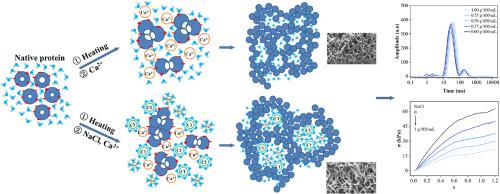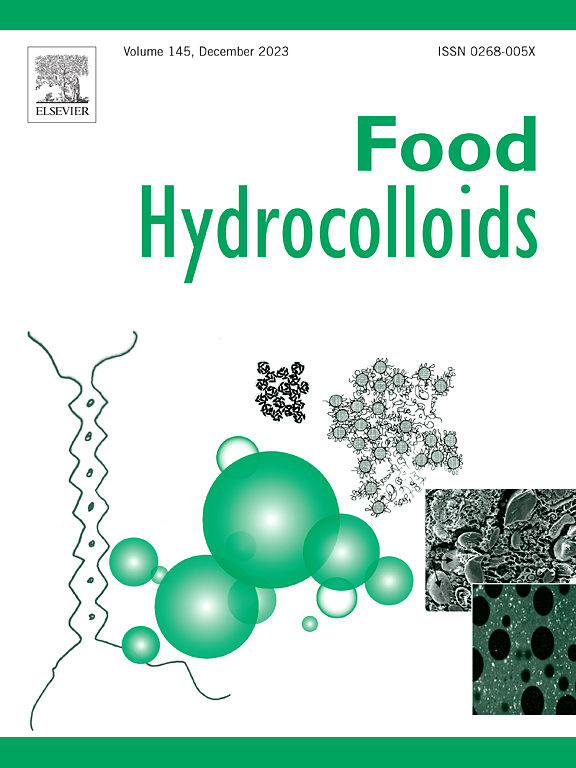豆浆中添加氯化钠诱导低水分豆腐质构变化的机理
IF 11
1区 农林科学
Q1 CHEMISTRY, APPLIED
引用次数: 0
摘要
本研究旨在探讨氯化钠(0-1 克/100 毫升)对钙凝低水分豆腐(LM-豆腐)质地特性的影响,并探索氯化钠引起相关特性变化的内在机制。增加豆浆中的氯化钠含量可提高低水分豆腐的产量(134.2-192.2 克/100 克大豆),增加水分含量(69.2-76.7%),降低蛋白质(11.3-16.3%)和脂质(6.87-9.22%)含量,提高大豆蛋白的水结合能力(WBC,4.26-6.78 克水蒸气/克蛋白质)和持水能力(WHC,3.63-5.49 克水蒸气/克蛋白质)。虽然氯化钠对蛋白质与动员水或紧密结合水之间的相互作用影响较小,但由于蛋白质带电基团与水合 Cl- 和 Na+ 离子之间的静电作用,氯化钠显著提高了蛋白质结合松散结合水的能力。此外,松散结合水的数量与蛋白质的 WBC 和 WHC 高度相关(相关系数分别为 0.999 和 0.995)。由于盐浓度增加,蛋白质与松散结合水的结合能力增强,导致 LM-tofu 蛋白质网络结构密度降低,强度减弱,变形能力降低。这项研究为开发高钙大豆蛋白食品提供了启示,以满足人们对健康、方便的植物性零食或膳食日益增长的需求。本文章由计算机程序翻译,如有差异,请以英文原文为准。

Mechanism governing textural changes of low-moisture tofu induced by NaCl addition in soymilk
This study aimed to investigate the impact of NaCl (0–1 g/100 mL) on the textural properties of calcium-coagulated low-moisture tofu (LM-tofu) and explore the underlying mechanism governing the NaCl-induced changes of relevant properties. Increasing the NaCl level in soymilk led to higher yield (134.2–192.2 g/100 g soybean) of LM-tofu with higher water content (69.2–76.7%), reduced protein (11.3–16.3%) and lipid (6.87–9.22%) levels, and enhanced water binding capacity (WBC, 4.26–6.78 g H2O/g protein) and water holding capacity (WHC, 3.63–5.49 g H2O/g protein) of soy proteins. Although NaCl had a minor effect on the interactions between proteins and mobilized water or tightly bound water, it significantly improved the proteins' ability to bind loosely bound water due to electrostatic interactions between the charged groups of proteins and hydrated Cl− and Na+ ions. Moreover, the amounts of loosely bound water were highly correlated with both WBC and WHC of proteins (correlation coefficient: 0.999 and 0.995, respectively). The enhanced water binding capacity of proteins for loosely bound water due to an increased salt level resulted in LM-tofu with a less dense protein network structure, weaker strength and reduced deformation ability. This study provides insights for the development of high-calcium, soy protein-based foods to meet the growing demands for healthy and convenient plant-based snacks or meals.
求助全文
通过发布文献求助,成功后即可免费获取论文全文。
去求助
来源期刊

Food Hydrocolloids
工程技术-食品科技
CiteScore
19.90
自引率
14.00%
发文量
871
审稿时长
37 days
期刊介绍:
Food Hydrocolloids publishes original and innovative research focused on the characterization, functional properties, and applications of hydrocolloid materials used in food products. These hydrocolloids, defined as polysaccharides and proteins of commercial importance, are added to control aspects such as texture, stability, rheology, and sensory properties. The research's primary emphasis should be on the hydrocolloids themselves, with thorough descriptions of their source, nature, and physicochemical characteristics. Manuscripts are expected to clearly outline specific aims and objectives, include a fundamental discussion of research findings at the molecular level, and address the significance of the results. Studies on hydrocolloids in complex formulations should concentrate on their overall properties and mechanisms of action, while simple formulation development studies may not be considered for publication.
The main areas of interest are:
-Chemical and physicochemical characterisation
Thermal properties including glass transitions and conformational changes-
Rheological properties including viscosity, viscoelastic properties and gelation behaviour-
The influence on organoleptic properties-
Interfacial properties including stabilisation of dispersions, emulsions and foams-
Film forming properties with application to edible films and active packaging-
Encapsulation and controlled release of active compounds-
The influence on health including their role as dietary fibre-
Manipulation of hydrocolloid structure and functionality through chemical, biochemical and physical processes-
New hydrocolloids and hydrocolloid sources of commercial potential.
The Journal also publishes Review articles that provide an overview of the latest developments in topics of specific interest to researchers in this field of activity.
 求助内容:
求助内容: 应助结果提醒方式:
应助结果提醒方式:


